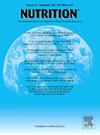四方面正念饮食量表(FFaMES-TR)在青少年中的土耳其效度和信度
IF 3.2
3区 医学
Q2 NUTRITION & DIETETICS
引用次数: 0
摘要
本研究旨在评估 Carrière 等人的 "四面正念进食量表 "在土耳其青少年群体中的有效性和可靠性。采用克朗巴赫α(CA)系数评估内部一致性可靠性,并采用重测法。为确定因子结构,进行了探索性因子分析(EFA)。结果量表的总 CA 为 0.893,非反应 CA 为 0.898,外部意识 0.808,非判断 0.862,内部意识 0.772。初测和复测的总分与分量表之间的关系显著(P < 0.001)。Kaiser-Meyer-Olkin 值为 0.903。经 Bartlett 球形度检验,各项目之间的相关水平足以进行因子分析(χ^2 = 5326.27,标准差 = 231,P = 0.001;P <;0.05)。各项目因子载荷介于 0.511 和 0.885 之间,各因子解释了 61.8%的方差。模型的拟合度可以接受(χ2/标准差 3.035,比较拟合指数 0.933,塔克-刘易斯指数 0.904,标准化均方根误差 0.057,近似均方根误差 0.058)。结论土耳其版四面正念进食量表在评估青少年正念进食行为方面是有效和可靠的。本文章由计算机程序翻译,如有差异,请以英文原文为准。
Turkish validity and reliability of the Four Facet Mindful Eating Scale (FFaMES-TR) in adolescence
Objectives
The aim of this study was to evaluate the validity and reliability of the Four Facet Mindful Eating Scale by Carrière et al. in a Turkish adolescent group.
Methods
The study included 591 participants between 14 and 17 years old. The Cronbach's alpha (CA) coefficient was used to evaluate the internal consistency reliability and the test-retest method was applied. Exploratory factor analysis (EFA) was performed to determine the factor structure. The model obtained with EFA was evaluated with confirmatory factor analysis.
Results
The total CA of the scale was 0.893, non-reactance CA 0.898, external awareness 0.808, non-judgment 0.862, internal awareness 0.772. The relationships between the total score and subscales in the first test and retest were found to be significant (P < 0.001). The Kaiser–Meyer–Olkin value was 0.903. Bartlett's test of sphericity, the correlation level between the items was found to be sufficient for factor analysis (χ^2 = 5326.27, standard deviation = 231, P = 0.001; P < 0.05). The factor loadings of the items were between 0.511 and 0.885, and the factors explained 61.8% of the variance. It was observed that the model had an acceptable fit (χ2/standard deviation 3.035, comparative fit index 0.933, Tucker–Lewis index 0.904, standardized root mean square error 0.057, and root mean square error of approximation 0.058. Because of applying EFA to the 29 questions in the scale, it was decided to remove 8 items from the final scale.
Conclusions
The Turkish version of the Four Facet Mindful Eating Scale is valid and reliable for assessing mindful eating behaviors among adolescents.
求助全文
通过发布文献求助,成功后即可免费获取论文全文。
去求助
来源期刊

Nutrition
医学-营养学
CiteScore
7.80
自引率
2.30%
发文量
300
审稿时长
60 days
期刊介绍:
Nutrition has an open access mirror journal Nutrition: X, sharing the same aims and scope, editorial team, submission system and rigorous peer review.
Founded by Michael M. Meguid in the early 1980''s, Nutrition presents advances in nutrition research and science, informs its readers on new and advancing technologies and data in clinical nutrition practice, encourages the application of outcomes research and meta-analyses to problems in patient-related nutrition; and seeks to help clarify and set the research, policy and practice agenda for nutrition science to enhance human well-being in the years ahead.
 求助内容:
求助内容: 应助结果提醒方式:
应助结果提醒方式:


